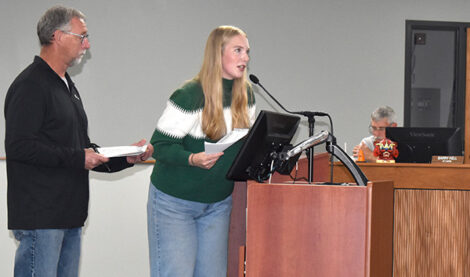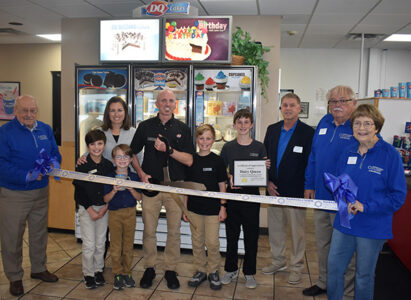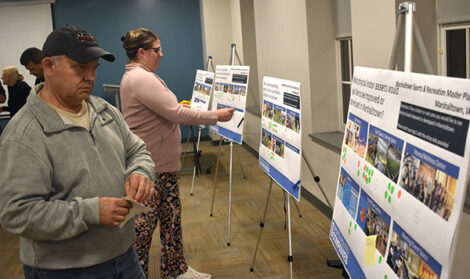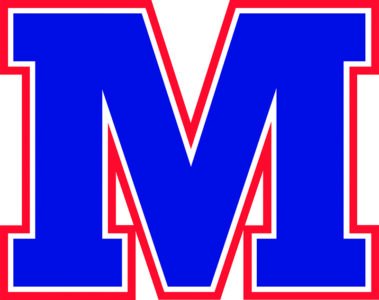Consultant recommends leaving open market garbage collection system in place
Other findings focus on recycling, junk disposal and requiring residential service
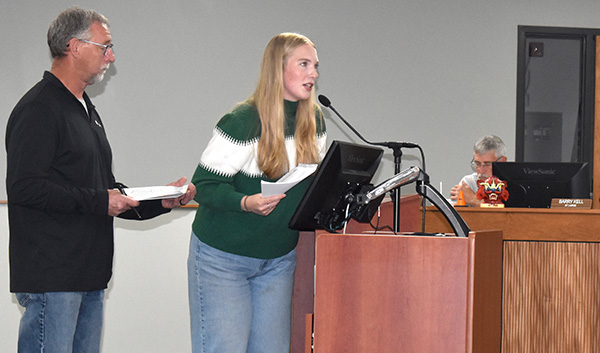
T-R PHOTO BY ROBERT MAHARRY — Todd Whitmore of Mid-Iowa Workshops, left, and Iowa State University Institute of Design Research and Outreach (IDRO) Program Coordinator Laurel Waterman, right, address the city council during Monday night’s meeting. Waterman presented the results of the solid waste study and recommended keeping the current open market system in place.
Iowa State University Institute of Design Research and Outreach (IDRO) Program Coordinator Laurel Waterman presented the results of the long-awaited solid waste study to the Marshalltown city council before a packed house during Monday night’s meeting and shared several recommendations, including keeping the current open market system in place.
Waterman said she gathered information primarily through interviews, meetings, a focus group with city staff, people in the waste management industry and individuals in other communities, and a waste management survey that garnered 960 responses. Her goal was to approach the study with a “consensus decision making” mindset as opposed to a simple majority rule principle or decisions based on what logistically might make the most sense on paper.
“The ultimate goal is to find a set of solutions, or in this case recommendations, that everyone with all viewpoints can support or at least agree to live with,” she said. “This can encourage working with each other rather than against each other. The implementation process is more likely to have success because it’s garnering more support and less pushback, and it can protect those with a minority opinion because it looks at people with all sets of viewpoints even if it’s maybe five percent of the population. So basically, the entire goal is not to make one group of people 100 percent satisfied while leaving some people in outright disagreement. The goal is for basically everybody to read the report and fully understand all of the recommendations and just be like ‘Yeah, sure, I can get behind that.'”
Waterman explained that she was simply “scratching the surface” Monday, and there may still be more outstanding questions — but she did encourage everyone to read the 38-page report for themselves before making conclusions. She then dove into each section, from who is responsible for collecting waste and how it is done to garbage and junk nuisances and waste diversion practices such as recycling, composting and waste reduction.
Her first and biggest recommendation was to maintain the open market system with private haulers, which had generated the most discussion in recent months.
“The most common practice for cities is to have a municipal or contract municipal collection system. While these are arguably the most efficient and streamlined systems, most residents are satisfied with the current collection system, with many having strong loyalty to their current providers,” she said, reading directly from the report. “This could be viewed as an obstacle to transitioning to a different system, but having satisfaction with and loyalty to local businesses is an aspect that makes Marshalltown special. Listening to resident preferences and supporting local businesses could be more beneficial to the community than transitioning to a system that lacks community support.”
Because municipal contract, segmented and/or zonal collection would eliminate customer choice and cause severe damage to existing businesses, she recommended maintaining the current system. Nonetheless, Waterman felt optional alternative practices within the current system such as a consolidated pickup schedule based on days of the week could still strengthen it, but they could still burden the smaller companies.
“However, I do believe that it is unlikely that a system would be enough of an improvement or kind of bear enough benefits to the community to outweigh that tedious process of transitioning to a regulated pickup schedule,” she said.
Another option is an expanded collection market allowing more companies to enter the market and increase competition further, which would have to be balanced against the potential for increased road damage. The second aspect of the study was garbage and junk nuisances based on researching current city codes on nuisances, garbage, open burning, the history of cleanup events, a windshield survey to address the average number of properties with visible junk on a given day, comparing the number of nuisance cases in Marshalltown compared to other cities and collecting resident and stakeholder input.
Her main recommendations were to expand junk programs within the community to offer one day a month of free junk disposal through the Marshall County Landfill with proof of residence or contracting with a collection company for residential curbside pickups. The second program she proposed is a voucher program for households that either choose not to or cannot afford to pay for regular pickup services, and it would allocate a certain number of vouchers for those in need for one year.
The third recommendation was requiring residential garbage service, which Waterman said is not common in communities with an open market system but is more common in cities with a municipal or municipal contract service. She only found one other Iowa community — Knoxville — with an open market system and a garbage service requirement.
Other suggestions were reviewing the city’s nuisance code and procedures and waste diversion through practices like recycling and composting. One recommendation was a single stream recycling system, which she admitted would constitute “a significant investment,” but Mid-Iowa Workshops, the landfill and the city would all have a big stake in it.
She also suggested improving recycling dropoffs by either making recycling dropoffs at the landfill completely free, creating a dropoff location in town somewhere near Mid-Iowa Workshops, and improving yard waste pickup by either contracting for a citywide yard waste pickup service or increasing funding for the compost facility to expand hours and/or reduce prices. The fourth recommendation was expanded education and outreach on recycling and waste diversion.
Currently, the landfill has its own program, but Waterman said people she talked to believed education was the most important aspect of increasing overall recycling rates.
“The city could support the Marshall County Landfill’s program. They could do kind of their own thing. They could partner with the library (or) the public schools, but youth education is a really important part because it kind of makes a bigger impact,” she said.
Options include a citywide recycling contract with one company or increased city initiatives to prioritize recycling like putting bins next to public trash cans. Once she had summarized her findings, Waterman opened the floor up to council questions.
Councilor Mike Ladehoff asked about the possibility of requiring service, and Waterman said she didn’t formally recommend it because she wasn’t sure of how much pushback it would get or what the legal ramifications would be, describing it as a “gray area.” She added that she had not spoken to representatives from Knoxville on how their policy is enforced.
Fellow Councilor Jeff Schneider said he was hoping to see more details on enforcing ordinances and potentially adding colored bands or symbols on receptacles designating the pickup dates, and he liked the idea of coordinating pickup days. He felt the problem wasn’t the people who pay their bills and bring their cans in like they’re supposed to, but rather the ordinance part.
“That’s how we got sent down this path,” Schneider said.
Councilor Gary Thompson told Waterman she did a great job on the project, and Mayor Joel Greer was impressed with the number of responses to the survey. Councilor Melisa Fonseca sought more details on recycling recommendations, and Waterman pointed to an example in Ames where a dropoff site is located at the resource recovery center, suggesting something similar in Marshalltown close to Mid-Iowa Workshops.
Fonseca was comfortable with keeping the open market system in place but hoped to see a recycling site within the city limits and the implementation of free junk disposal days at the landfill. Thompson hoped the discussion would “put to bed” the idea that the city would be moving to a new collection system, but people leaving their trash out for multiple days still needed to be addressed.
He also agreed with Fonseca that driving out to the landfill, which is located outside of city limits west of town, is a barrier to increasing recycling rates. With the consensus to leave the open market system in place, Webb vowed to study the recommendations further and see how they could be implemented in the future.
Ladehoff didn’t feel that he knew anyone who wanted a municipal garbage service, and he commented that dropoff days hadn’t been well attended in recent years. He also hoped to have further discussions on mandatory garbage service, though he wasn’t sure if he was for it.
Councilor Greg Nichols echoed Schneider’s comments about targeting individuals who abuse the system or simply don’t care, and Greer noted that there were dropoff spots for recycling when he moved to town in 1986. Councilor Barry Kell said he lives in an area where cans are sitting out three days a week, and he felt there was work to be done to ensure the community is clean and kept up as residents and officials desire. Citing a recent trip to Ames, where receptacles are color coded, he suggested using that as a potential example.
Kell thought maintaining the open market system and requiring service would likely be mutually exclusive ideas, and he said there are definitely people collecting garbage for extended periods of time and creating issues for their neighbors. During the public comment period, Jim Shaw commended Waterman on her presentation, and Todd Whitmore of Mid-Iowa Workshops asked about the cost of a single stream recycling system.
Based on a conversation with an official from the city of Ames, Waterman replied that it could run anywhere from $1 million to $5 million for a full sorting machine, but there are options for a cheaper system. Whitmore said cost would be “a huge factor” for MIW, but he didn’t think they would need a new system as they are only at 40 to 50 percent capacity currently.
Before the conversation concluded, Fonseca asked Webb to reach back out to Knight Sanitation of Eldora, which was previously denied a garbage and refuse license within the city of Marshalltown back in February, to see if they would be interested in applying a second time. The council took no official action.

